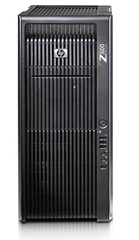
Today, HP is neck-and-neck with the former market leader in the race for primacy, and if HP’s trajectory holds, it should surpass Dell as the dominant manufacturer globally.
How did HP get here?
How does a company achieve so many years of scintillating double-digit growth in a highly contested space?
Where were its competitors?
These were the questions I had been pondering for quite a while, and in order to answer them, I was planning a trip to the HP Personal Workstation Team’s home base of Fort Collins, Colorado.
As luck would have it, I was fortuitously invited to participate in the 2010 HP Workstation Lab Experience Event at that very location. Elated, I accepted, and attended the event.
The 2010 HP Workstations Lab Event
At the event, I was able to get an even greater feel for HP’s Personal Workstations.
- First off, the brain trust at the helm of HP Workstations Team have a minimum of twenty (20) years’ experience each at HP.
- Secondly, they displayed something of great importance to me: a reverence and respect for the rich history of innovation and invention behind HP products.
- Thirdly, they are obsessed with keeping a dynamic feedback loop open between themselves and their customers and partners.
- Fourthly, they are open to not only using their feedback to improve on their products, they are open to partnering with customers in order to bring innovation – DreamColor, anyone? – to market.
- Finally, as delivered in their products going back to the xw-series of workstations, this team cares about our planet, and they are delivering products that are not only powerful, but are Green in every sense of the word, and are compliant with several Earth-friendly initiatives.
We were also treated to a briefing by Jeff Han, founder and Chief Scientist at Perceptive Pixels, a satisfied customer. His company’s products need to be seen to be believed. In fact, I place Perceptive Pixels in the “Why is this company still un-acquired category?” Their technology truly sends one’s mind on a trip!
Finally, a trip to the HP Workstation Museum was given. As someone who came up the engineering ranks from a MicroVAX and the Intergraph Clipper workstations, seeing these HP stalwarts of eons past brought back memories of other workstation vendors from the days of yore: DEC, Prime, Stratus, Stellar, Ardent, Evans & Sutherland, Silicon Graphics Inc. (SGI), Stardent (merger of Stellar & Ardent), Cray, Apollo, IBM (yes, IBM!), Sun, NeXT, Multiflow. Man, those were the halcyon days of personal workstation computing!
It is worth noting that today, apart from a spent SGI that is circling the drain, only HP is left standing!
A separate two-part series on the progenitors of today’s HP Personal Workstations will be delivered ahead of my review of the Intel Xeon “Westmere” z800 Personal Workstation.
During this tour, we went everywhere, saw everything – except, of course, those products that were kept under opaque cover we were ushered away from hastily – and we spoke to everyone.
I have photos, videos, and notes. A couple more posts will be devoted to just the Lab Experience. I will post the videos shortly too.
Conclusions
I am immensely impressed with the HP Workstation Team.
There, I’ve gotten that statement out at the very top.
Their products have been perennial winners of the top trophies here at AbsolutelyWindows and SmallBizWindows. I have found them to be extremely well-engineered, and well-built systems. In fact, my personal desktop is the HP z600 Personal Workstation, although it not as kitted out as any of the John Obeto Specials.
If you use workstations like I do, from the desktop units to the sweet EliteBook mobile workstations, I am sure you would find this series informative.


